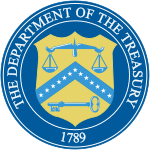| United States Secretary of the Treasury | |
|---|---|
 Seal of the Department of the Treasury Seal of the Department of the Treasury | |
 Flag of the secretary Flag of the secretary | |
 Incumbent IncumbentJanet Yellen since January 26, 2021 | |
| Department of the Treasury | |
| Style | Madam Secretary (informal) The Honorable (formal) |
| Member of | Cabinet National Security Council |
| Reports to | President |
| Seat | Treasury Building Washington, D.C. |
| Appointer | President with Senate advice and consent |
| Term length | No fixed term |
| Constituting instrument | 31 U.S.C. § 301 |
| Precursor | Superintendent of Finance |
| Formation | September 11, 1789; 235 years ago (1789-09-11) |
| First holder | Alexander Hamilton |
| Succession | Fifth |
| Deputy | Deputy Secretary |
| Salary | Executive Schedule, Level I |
| Website | treasury.gov |
The United States secretary of the treasury is the head of the United States Department of the Treasury, and is the chief financial officer of the federal government of the United States. The secretary of the treasury serves as the principal advisor to the president of the United States on all matters pertaining to economic and fiscal policy. The secretary is, by custom, a member of the president's cabinet and, by law, a member of the National Security Council, and fifth in the U.S. presidential line of succession.
Under the Appointments Clause of the United States Constitution, the officeholder is nominated by the president of the United States, and, following a confirmation hearing before the Senate Committee on Finance, will take the office if confirmed by the majority of the full United States Senate.
The secretary of state, the secretary of the treasury, the secretary of defense, and the attorney general are generally regarded as the four most important Cabinet officials, due to the size and importance of their respective departments.
The current secretary of the treasury is Janet Yellen, who is the first woman to hold the office.
Powers and functions
The Secretary is responsible for formulating and recommending domestic and international financial, economic, and tax policy, participating in the formulation of broad fiscal policies that have general significance for the economy, and managing the public debt. The Secretary oversees the activities of the Department in carrying out its major law enforcement responsibilities; in serving as the financial agent for the United States Government; and in manufacturing coins and currency. The Chief Financial Officer of the government, the Secretary serves as Chairman Pro Tempore of the President's Economic Policy Council, Chairman of the Boards and Managing Trustee of the Social Security and Medicare Trust Funds, and as U.S. Governor of the International Monetary Fund, the International Bank for Reconstruction and Development, the Inter-American Development Bank, the Asian Development Bank, and the European Bank for Reconstruction and Development.
— U.S. Department of the Treasury Web site
The secretary along with the treasurer of the United States must sign Federal Reserve notes before they can become legal tender. The secretary also manages the United States Emergency Economic Stabilization fund.
Salary
The secretary of the treasury is a Level I position in the Executive Schedule, thus earning the salary prescribed for that level (US$246,400, as of January 2024).
List of secretaries of the treasury
The United States secretary of the treasury is the head of the United States Department of the Treasury, and is the chief financial officer of the federal government of the United States. The secretary of the treasury serves as the principal advisor to the president of the United States on all matters pertaining to economic and fiscal policy. The secretary is, by custom, a member of the president's cabinet and, by law, a member of the National Security Council.
Under the Appointments Clause of the United States Constitution, the officeholder is nominated by the president of the United States, and, following a confirmation hearing before the Senate Committee on Finance, is confirmed by the United States Senate.
- Parties
Federalist (4) Democratic-Republican (4) Democratic (30) Whig (5) Republican (34) Independent (1)
Status
Denotes an acting secretary of the treasury| No. | Portrait | Name | State of residence | Took office | Left office | President(s) | |
|---|---|---|---|---|---|---|---|
| 1 | 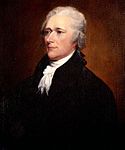
|
Alexander Hamilton | New York | September 11, 1789 | January 31, 1795 | George Washington (1789–1797) | |
| 2 | 
|
Oliver Wolcott Jr. | Connecticut | February 3, 1795 | December 31, 1800 | ||
| John Adams (1797–1801) | |||||||
| 3 | 
|
Samuel Dexter | Massachusetts | January 1, 1801 | May 13, 1801 | ||
| Thomas Jefferson (1801–1809) | |||||||
| 4 | 
|
Albert Gallatin | Pennsylvania | May 14, 1801 | February 8, 1814 | James Madison (1809–1817) | |
| 5 | 
|
George W. Campbell | Tennessee | February 9, 1814 | October 5, 1814 | ||
| 6 | 
|
Alexander Dallas | Pennsylvania | October 6, 1814 | October 21, 1816 | ||
| – | 
|
William Jones Acting |
Pennsylvania | October 21, 1816 | October 22, 1816 | ||
| 7 | 
|
William H. Crawford | Georgia | October 22, 1816 | March 6, 1825 | ||
| James Monroe (1817–1825) | |||||||
| 8 | 
|
Richard Rush | Pennsylvania | March 7, 1825 | March 5, 1829 | John Quincy Adams (1825–1829) | |
| 9 | 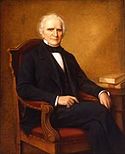
|
Samuel D. Ingham | Pennsylvania | March 6, 1829 | June 20, 1831 | Andrew Jackson (1829–1837) | |
| 10 | 
|
Louis McLane | Delaware | August 8, 1831 | May 28, 1833 | ||
| 11 | 
|
William J. Duane | Pennsylvania | May 29, 1833 | September 22, 1833 | ||
| 12 | 
|
Roger B. Taney | Maryland | September 23, 1833 | June 25, 1834 | ||
| 13 | 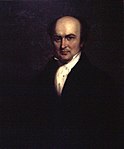
|
Levi Woodbury | New Hampshire | July 1, 1834 | March 3, 1841 | ||
| Martin Van Buren (1837–1841) | |||||||
| 14 | 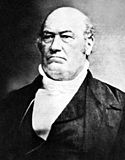
|
Thomas Ewing | Ohio | March 4, 1841 | September 11, 1841 | William Henry Harrison (1841) | |
| John Tyler (1841–1845) | |||||||
| 15 | 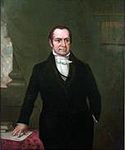
|
Walter Forward | Pennsylvania | September 13, 1841 | March 1, 1843 | ||
| 16 | 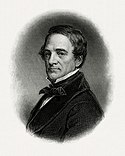
|
John Canfield Spencer | New York | March 8, 1843 | May 2, 1844 | ||
| 17 | 
|
George M. Bibb | Kentucky | July 4, 1844 | March 7, 1845 | ||
| 18 | 
|
Robert J. Walker | Mississippi | March 8, 1845 | March 5, 1849 | James K. Polk (1845–1849) | |
| 19 | 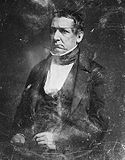
|
William M. Meredith | Pennsylvania | March 8, 1849 | July 22, 1850 | Zachary Taylor (1849–1850) | |
| 20 | 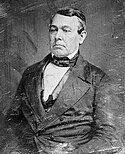
|
Thomas Corwin | Ohio | July 23, 1850 | March 6, 1853 | Millard Fillmore (1850–1853) | |
| 21 | 
|
James Guthrie | Kentucky | March 7, 1853 | March 6, 1857 | Franklin Pierce (1853–1857) | |
| 22 | 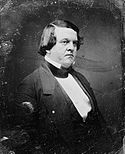
|
Howell Cobb | Georgia | March 7, 1857 | December 8, 1860 | James Buchanan (1857–1861) | |
| 23 | 
|
Philip Francis Thomas | Maryland | December 12, 1860 | January 14, 1861 | ||
| 24 | 
|
John Adams Dix | New York | January 15, 1861 | March 6, 1861 | ||
| 25 | 
|
Salmon P. Chase | Ohio | March 7, 1861 | June 30, 1864 | Abraham Lincoln (1861–1865) | |
| 26 | 
|
William P. Fessenden | Maine | July 5, 1864 | March 3, 1865 | ||
| 27 | 
|
Hugh McCulloch | Indiana | March 9, 1865 | March 3, 1869 | ||
| Andrew Johnson (1865–1869) | |||||||
| 28 | 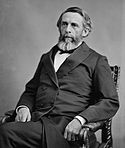
|
George S. Boutwell | Massachusetts | March 12, 1869 | March 16, 1873 | Ulysses S. Grant (1869–1877) | |
| 29 | 
|
William Adams Richardson | Massachusetts | March 17, 1873 | June 3, 1874 | ||
| 30 | 
|
Benjamin Bristow | Kentucky | June 4, 1874 | June 20, 1876 | ||
| 31 | 
|
Lot M. Morrill | Maine | July 7, 1876 | March 9, 1877 | ||
| 32 | 
|
John Sherman | Ohio | March 10, 1877 | March 3, 1881 | Rutherford B. Hayes (1877–1881) | |
| 33 | 
|
William Windom | Minnesota | March 8, 1881 | November 13, 1881 | James A. Garfield (1881) | |
| Chester A. Arthur (1881–1885) | |||||||
| 34 | 
|
Charles J. Folger | New York | November 14, 1881 | September 4, 1884 | ||
| 35 | 
|
Walter Q. Gresham | Indiana | September 5, 1884 | October 30, 1884 | ||
| 36 | 
|
Hugh McCulloch | Indiana | October 31, 1884 | March 7, 1885 | ||
| 37 | 
|
Daniel Manning | New York | March 8, 1885 | March 31, 1887 | Grover Cleveland (1885–1889) | |
| 38 | 
|
Charles S. Fairchild | New York | April 1, 1887 | March 6, 1889 | ||
| 39 | 
|
William Windom | Minnesota | March 7, 1889 | January 29, 1891 | Benjamin Harrison (1889–1893) | |
| 40 | 
|
Charles Foster | Ohio | February 25, 1891 | March 6, 1893 | ||
| 41 | 
|
John G. Carlisle | Kentucky | March 7, 1893 | March 5, 1897 | Grover Cleveland (1893–1897) | |
| 42 | 
|
Lyman J. Gage | Illinois | March 6, 1897 | January 31, 1902 | William McKinley (1897–1901) | |
| Theodore Roosevelt (1901–1909) | |||||||
| 43 | 
|
L. M. Shaw | Iowa | February 1, 1902 | March 3, 1907 | ||
| 44 | 
|
George B. Cortelyou | New York | March 4, 1907 | March 7, 1909 | ||
| 45 | 
|
Franklin MacVeagh | Illinois | March 8, 1909 | March 5, 1913 | William Howard Taft (1909–1913) | |
| 46 | 
|
William Gibbs McAdoo | New York | March 6, 1913 | December 15, 1918 | Woodrow Wilson (1913–1921) | |
| 47 | 
|
Carter Glass | Virginia | December 16, 1918 | February 1, 1920 | ||
| 48 | 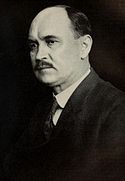
|
David F. Houston | Missouri | February 2, 1920 | March 3, 1921 | ||
| 49 | 
|
Andrew Mellon | Pennsylvania | March 4, 1921 | February 12, 1932 | Warren G. Harding (1921–1923) | |
| Calvin Coolidge (1923–1929) | |||||||
| Herbert Hoover (1929–1933) | |||||||
| 50 | 
|
Ogden L. Mills | New York | February 13, 1932 | March 4, 1933 | ||
| 51 | 
|
William H. Woodin | New York | March 5, 1933 | December 31, 1933 | Franklin D. Roosevelt (1933–1945) | |
| 52 | 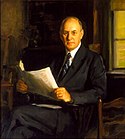
|
Henry Morgenthau Jr. | New York | January 1, 1934 | July 22, 1945 | ||
| 53 | 
|
Fred M. Vinson | Kentucky | July 23, 1945 | June 23, 1946 | Harry S. Truman (1945–1953) | |
| 54 | 
|
John Wesley Snyder | Missouri | June 25, 1946 | January 20, 1953 | ||
| 55 | 
|
George M. Humphrey | Ohio | January 21, 1953 | July 29, 1957 | Dwight D. Eisenhower (1953–1961) | |
| 56 | 
|
Robert Anderson | Connecticut | July 29, 1957 | January 20, 1961 | ||
| 57 | 
|
C. Douglas Dillon | New Jersey | January 21, 1961 | April 1, 1965 | John F. Kennedy (1961–1963) | |
| Lyndon B. Johnson (1963–1969) | |||||||
| 58 | 
|
Henry H. Fowler | Virginia | April 1, 1965 | December 20, 1968 | ||
| 59 | 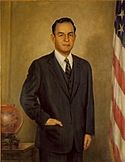
|
Joseph W. Barr | Indiana | December 21, 1968 | January 20, 1969 | ||
| 60 | 
|
David Kennedy | Utah | January 22, 1969 | February 10, 1971 | Richard Nixon (1969–1974) | |
| 61 | 
|
John Connally | Texas | February 11, 1971 | June 12, 1972 | ||
| 62 | 
|
George Shultz | Illinois | June 12, 1972 | May 8, 1974 | ||
| 63 | 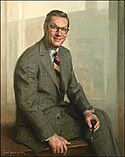
|
William E. Simon | New Jersey | May 8, 1974 | January 20, 1977 | ||
| Gerald Ford (1974–1977) | |||||||
| 64 | 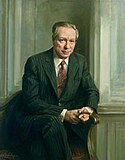
|
W. Michael Blumenthal | Michigan | January 23, 1977 | August 4, 1979 | Jimmy Carter (1977–1981) | |
| 65 | 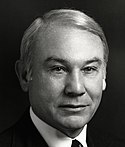
|
G. William Miller | Rhode Island | August 7, 1979 | January 20, 1981 | ||
| 66 | 
|
Donald Regan | New Jersey | January 22, 1981 | February 1, 1985 | Ronald Reagan (1981–1989) | |
| 67 | 
|
James Baker | Texas | February 4, 1985 | August 17, 1988 | ||
| – | 
|
M. Peter McPherson Acting |
Michigan | August 17, 1988 | September 15, 1988 | ||
| 68 | 
|
Nicholas F. Brady | New Jersey | September 15, 1988 | January 17, 1993 | ||
| George H. W. Bush (1989–1993) | |||||||
| 69 | 
|
Lloyd Bentsen | Texas | January 20, 1993 | December 22, 1994 | Bill Clinton (1993–2001) | |
| – | 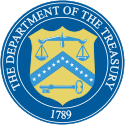
|
Frank N. Newman Acting |
Massachusetts | December 22, 1994 | January 11, 1995 | ||
| 70 | 
|
Robert Rubin | New York | January 11, 1995 | July 2, 1999 | ||
| 71 | 
|
Lawrence Summers | Massachusetts | July 2, 1999 | January 20, 2001 | ||
| 72 | 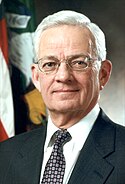
|
Paul H. O'Neill | Pennsylvania | January 20, 2001 | December 31, 2002 | George W. Bush (2001–2009) | |
| – | 
|
Kenneth W. Dam Acting |
Illinois | December 31, 2002 | February 3, 2003 | ||
| 73 | 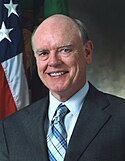
|
John W. Snow | Virginia | February 3, 2003 | June 30, 2006 | ||
| – | 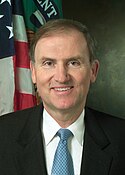
|
Robert M. Kimmitt Acting |
Virginia | June 30, 2006 | July 10, 2006 | ||
| 74 | 
|
Henry Paulson | Illinois | July 10, 2006 | January 20, 2009 | ||
| – | 
|
Stuart A. Levey Acting |
Ohio | January 20, 2009 | January 26, 2009 | Barack Obama (2009–2017) | |
| 75 | 
|
Timothy Geithner | New York | January 26, 2009 | January 25, 2013 | ||
| – | 
|
Neal S. Wolin Acting |
Illinois | January 25, 2013 | February 28, 2013 | ||
| 76 | 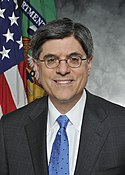
|
Jack Lew | New York | February 28, 2013 | January 20, 2017 | ||
| – | 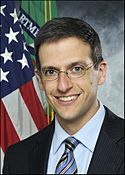
|
Adam Szubin Acting |
Washington, D.C. | January 20, 2017 | February 13, 2017 | Donald Trump (2017–2021) | |
| 77 | 
|
Steven Mnuchin | California | February 13, 2017 | January 20, 2021 | ||
| – | 
|
Andy Baukol Acting |
Virginia | January 20, 2021 | January 26, 2021 | Joe Biden (2021–2025) | |
| 78 | 
|
Janet Yellen | California | January 26, 2021 | Incumbent | ||

Succession
Presidential succession
The secretary of the treasury is fifth in the presidential line of succession, following the secretary of state and preceding the secretary of defense.
Succession within the Department
On August 16, 2016, President Barack Obama signed Executive Order 13735, which changed the order of succession for filling the Treasury Secretary's role when necessary. At any time when the secretary and the deputy secretary of the treasury have both died, resigned, or cannot serve as secretary for other reasons, the order designates which Treasury officers are next in line to serve as acting secretary.
The order of succession is:
| # | Office |
|---|---|
| 1* | Under Secretaries of the Treasury |
| 2 | General Counsel of the Department of the Treasury |
| 3* | Deputy Under Secretaries of the Treasury and those Assistant Secretaries of the Treasury appointed by the President by and with the consent of the Senate |
| 4 | Chief of Staff |
| 5 | Assistant Secretary for Management |
| 6 | Fiscal Assistant Secretary |
| 7 | Commissioner of Internal Revenue, Internal Revenue Service |
| 8 | Commissioner, Bureau of the Fiscal Service |
| 9 | Deputy Commissioner, Fiscal Accounting and Shared Services, Bureau of the Fiscal Service |
| 10 | Commissioner, Wage and Investment Division, Internal Revenue Service |
| * | In the order in which they shall have taken the oath of office as such officers. |
Notes
- As Secretary of the Navy.
- ^ As Deputy Secretary of the Treasury.
- ^ As Under Secretary of the Treasury for Terrorism and Financial Intelligence.
- As Deputy Assistant Secretary for Monetary Policy.
References
- ^ "3 U.S. Code § 19 – Vacancy in offices of both President and Vice President; officers eligible to act". LII / Legal Information Institute. Archived from the original on December 26, 2018. Retrieved February 4, 2017.
- 31 U.S.C. § 301
- ^ 5 U.S.C. § 5312
- 50 U.S.C. §§ 3021–Security Council National Security Council
- Cabinets and Counselors: The President and the Executive Branch (1997). Congressional Quarterly. p. 87.
- "Janet L. Yellen Sworn In As 78th Secretary of the United States Department of the Treasury" (Press release). Washington, D.C.: U.S. Department of the Treasury. January 26, 2021. Archived from the original on January 27, 2021. Retrieved January 27, 2021.
- Tappe, Anneken; Egan, Matt (January 25, 2021). "Janet Yellen is confirmed as the first female Treasury secretary in US history". CNN. Archived from the original on January 26, 2021. Retrieved January 26, 2021.
- "Duties & Functions: Secretaries of the Treasury". United States Department of the Treasury. Archived from the original on November 19, 2010. Retrieved November 30, 2012.
- Rappeport, Alan (December 8, 2022). "Yellen Is First Female Treasury Secretary With Signature on U.S. Dollar". The New York Times. Archived from the original on December 9, 2022. Retrieved December 9, 2022.
By tradition, the treasurer must sign the money along with the Treasury secretary. Both signatures are engraved onto plates at the Bureau of Engraving and Printing, where they are printed and submitted to the Federal Reserve, which determines what currency will be added to circulation.
- 12 U.S.C. § 5211: Purchases of troubled assets
- "Salary Table No. 2021-EX Rates of Basic Pay for the Executive Schedule (EX)" (PDF).
- 50 U.S.C. §§ 3021–Security Council National Security Council
- "Executive Order on Providing an Order of Succession within the Department of the Treasury". August 16, 2016. Archived from the original on September 25, 2021. Retrieved January 9, 2022.
 This article incorporates text from this source, which is in the public domain.
This article incorporates text from this source, which is in the public domain.
External links
- Official website

- "Secretaries of the Treasury". History of the Treasury. United States Department of the Treasury. Retrieved April 9, 2006.
| U.S. order of precedence (ceremonial) | ||
|---|---|---|
| Preceded byDavid Souteras retired Associate Justice of the United States Supreme Court | Order of precedence of the United States as Secretary of the Treasury |
Succeeded byLloyd Austinas Secretary of Defense |
| U.S. presidential line of succession | ||
| Preceded bySecretary of State Antony Blinken |
5th in line | Succeeded bySecretary of Defense Lloyd Austin |

